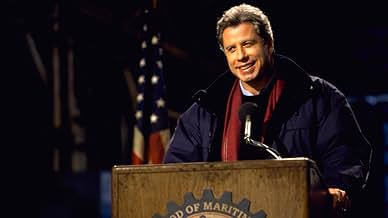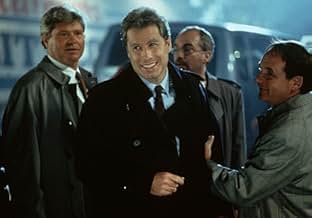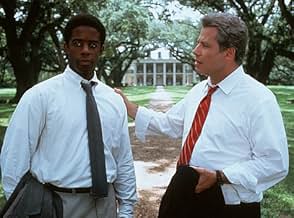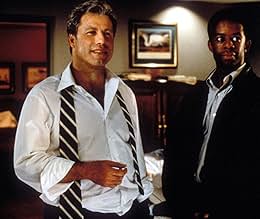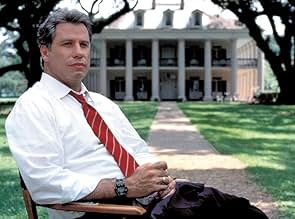A man joins the political campaign of a smooth-operator candidate for President of the United States of America.A man joins the political campaign of a smooth-operator candidate for President of the United States of America.A man joins the political campaign of a smooth-operator candidate for President of the United States of America.
- Nominated for 2 Oscars
- 10 wins & 31 nominations total
- Director
- Writers
- All cast & crew
- Production, box office & more at IMDbPro
Storyline
Did you know
- TriviaThen-President Bill Clinton enjoyed this movie so much that he even invited John Travolta to a party, on one condition, he must come as Governor Jack Stanton. Travolta declined.
- GoofsWhen watching the New Hampshire returns, one TV station says that Governor Stanton is still out campaigning on the street until the polls close while the other simultaneously says 15 percent of the vote has already been counted. Votes aren't counted until after the polls close.
- Quotes
[with a gun in her enemy's crotch]
Libby Holden: I am a gay lesbian woman! I do not mythologize the male sexual organ!
- SoundtracksPrimrose Lane
Written by Wayne Shanklin and George 'Red' Callender (as George Callender)
Featured review
"Primary Colors" is about a fictional American politician named Jack Stanton and his attempt to obtain the Democratic Party's nomination for the Presidency. At least, it's ostensibly about a fictional politician. On another level, it is a film a clef about a real American politician named Bill Clinton and his attempt to obtain the Democratic Party's nomination for the Presidency in 1992. The parallels between Clinton and Stanton go much deeper than the deliberate similarity of their surnames. Like Clinton, Stanton is the Governor of a small Southern state. Like Clinton, he has an idealistic streak in his nature and a talent for putting his ideas across in a relaxed, folksy way. (Clinton should have inherited Reagan's title of "The Great Communicator"). And, like Clinton, he also has a talent for getting himself enmeshed in scandal, particularly of a sexual nature.
Other players in the Clinton drama have their equivalents in the film. The Hillary-figure is Stanton's wife Susan, ever supportive and forgiving in public but in private much less ready to pardon her husband's misdemeanours. Stanton's campaign chief Richard Jemmons is presumably based upon James Carville, who fulfilled the same role for Clinton. Stanton's early rival Lawrence Harris parallels Paul Tsongas, who initially led the race for the Democratic nomination but later faded. There is a Gennifer Flowers (or Paula Jones) equivalent in the shape of Cashmere McCarthy, who claims that she had an affair with Stanton.
Although Stanton is, in one sense, the pivotal character (if he were not running for President there would be no film), in another sense the main character is one of his campaign team, Henry Burton, the grandson of a noted black civil rights activist, as the action is seen though his eyes. Henry is an idealistic young man who is caught in two minds about his boss. On the one hand he admires Stanton for his drive and energy and his sincere determination to improve the lot of ordinary people. On the other hand, he is disillusioned with the corruption involved in politics and with the dirty tricks played both against Stanton and on his behalf. The audience are often in two minds about Stanton as well, as he seems to be a fifty-fifty mixture of sincerity and sleaze.
I have never read the novel (originally credited to "Anonymous", but now known to have been written by Joe Klein) on which the film is based, but from what I have heard Stanton was considerably less sympathetic in the book than he appears in the film. (Perhaps traditionally liberal Hollywood did not want to give the Democratic Party too rough a ride). As portrayed by John Travolta, Stanton is in many ways a likable figure, whose flaws are outweighed by his good qualities. Besides his sincere idealism he also shows courage (he tells an audience of unemployed New England shipyard workers that there are no easy answers to their economic problems). In the first half of the film, in particular, it seemed that the film-makers wanted to acquit Stanton (and by implication Clinton) of any serious wrongdoing. Cashmere McCarthy, for example, is exposed as a liar (her surname is presumably borrowed from the notorious Senator who specialised in smearing his opponents) and a supposedly incriminating tape as a fake. Clinton must have wished that the Flowers, Jones and Lewinsky affairs could have been explained away as easily. There is a reference to Whitewater in the shape of the "Freshwater affair", but this is attributed not to Stanton but to one of his opponents.
In the second half of the film, the plot starts to diverge more from real events. Stanton is hit by a second sex scandal, potentially more damaging than any of those Clinton faced, as it involves allegations that he fathered a child by an under-aged girl. In reality, Clinton had a fairly easy ride to the Democratic nomination, but the film-makers obviously wanted to introduce a greater element of drama, as Stanton faces a tough challenge from a late entrant in the race, Fred Picker, the Governor of Florida. (Picker is not based on any actual politician). The climax of the story comes when the Stanton camp discover evidence that Picker, hitherto regarded as scandal-free, has been involved in cocaine-taking and a gay relationship. This presents Stanton and his aides with a moral dilemma; do they use this information to discredit Picker or do they bury it (with the attendant risk that the Republicans might discover it if Picker becomes the Democratic candidate)?
The film is helped by some excellent acting. Travolta is an actor who seems constantly to be re-inventing himself, particularly since "Pulp Fiction" took his career in a new direction, and Stanton is one of his best performances, clearly based upon Clinton but different enough to emerge as a character in his own right. Larry Hagman makes a plausibly charismatic Picker, proving that there is more to him than JR and "I Dream of Jeannie". Special mentions must also go to Emma Thompson's long-suffering Susan, Billy Bob Thornton's Jemmons, a hard-bitten, cynical practitioner of Realpolitik, and, above all, Kathy Bates as Libby, another Stanton aide. Some actresses would have struggled to make Libby- a tough, foul-mouthed lesbian recently released from a mental hospital who at one point threatens to shoot a man in the genitals- anything more than an over-the-top caricature, but Bates manages the difficult task of making her a believable character. Her "Best Supporting Actress" nomination was well deserved.
One reviewer complains that "Travolta does a poor Clinton impression", but despite its obvious relation to real events, "Primary Colors" is more than just a satire on Bill Clinton and his associates. It is a wider satire on American politics in general and a drama that asks some difficult questions about political morality. 7/10
Other players in the Clinton drama have their equivalents in the film. The Hillary-figure is Stanton's wife Susan, ever supportive and forgiving in public but in private much less ready to pardon her husband's misdemeanours. Stanton's campaign chief Richard Jemmons is presumably based upon James Carville, who fulfilled the same role for Clinton. Stanton's early rival Lawrence Harris parallels Paul Tsongas, who initially led the race for the Democratic nomination but later faded. There is a Gennifer Flowers (or Paula Jones) equivalent in the shape of Cashmere McCarthy, who claims that she had an affair with Stanton.
Although Stanton is, in one sense, the pivotal character (if he were not running for President there would be no film), in another sense the main character is one of his campaign team, Henry Burton, the grandson of a noted black civil rights activist, as the action is seen though his eyes. Henry is an idealistic young man who is caught in two minds about his boss. On the one hand he admires Stanton for his drive and energy and his sincere determination to improve the lot of ordinary people. On the other hand, he is disillusioned with the corruption involved in politics and with the dirty tricks played both against Stanton and on his behalf. The audience are often in two minds about Stanton as well, as he seems to be a fifty-fifty mixture of sincerity and sleaze.
I have never read the novel (originally credited to "Anonymous", but now known to have been written by Joe Klein) on which the film is based, but from what I have heard Stanton was considerably less sympathetic in the book than he appears in the film. (Perhaps traditionally liberal Hollywood did not want to give the Democratic Party too rough a ride). As portrayed by John Travolta, Stanton is in many ways a likable figure, whose flaws are outweighed by his good qualities. Besides his sincere idealism he also shows courage (he tells an audience of unemployed New England shipyard workers that there are no easy answers to their economic problems). In the first half of the film, in particular, it seemed that the film-makers wanted to acquit Stanton (and by implication Clinton) of any serious wrongdoing. Cashmere McCarthy, for example, is exposed as a liar (her surname is presumably borrowed from the notorious Senator who specialised in smearing his opponents) and a supposedly incriminating tape as a fake. Clinton must have wished that the Flowers, Jones and Lewinsky affairs could have been explained away as easily. There is a reference to Whitewater in the shape of the "Freshwater affair", but this is attributed not to Stanton but to one of his opponents.
In the second half of the film, the plot starts to diverge more from real events. Stanton is hit by a second sex scandal, potentially more damaging than any of those Clinton faced, as it involves allegations that he fathered a child by an under-aged girl. In reality, Clinton had a fairly easy ride to the Democratic nomination, but the film-makers obviously wanted to introduce a greater element of drama, as Stanton faces a tough challenge from a late entrant in the race, Fred Picker, the Governor of Florida. (Picker is not based on any actual politician). The climax of the story comes when the Stanton camp discover evidence that Picker, hitherto regarded as scandal-free, has been involved in cocaine-taking and a gay relationship. This presents Stanton and his aides with a moral dilemma; do they use this information to discredit Picker or do they bury it (with the attendant risk that the Republicans might discover it if Picker becomes the Democratic candidate)?
The film is helped by some excellent acting. Travolta is an actor who seems constantly to be re-inventing himself, particularly since "Pulp Fiction" took his career in a new direction, and Stanton is one of his best performances, clearly based upon Clinton but different enough to emerge as a character in his own right. Larry Hagman makes a plausibly charismatic Picker, proving that there is more to him than JR and "I Dream of Jeannie". Special mentions must also go to Emma Thompson's long-suffering Susan, Billy Bob Thornton's Jemmons, a hard-bitten, cynical practitioner of Realpolitik, and, above all, Kathy Bates as Libby, another Stanton aide. Some actresses would have struggled to make Libby- a tough, foul-mouthed lesbian recently released from a mental hospital who at one point threatens to shoot a man in the genitals- anything more than an over-the-top caricature, but Bates manages the difficult task of making her a believable character. Her "Best Supporting Actress" nomination was well deserved.
One reviewer complains that "Travolta does a poor Clinton impression", but despite its obvious relation to real events, "Primary Colors" is more than just a satire on Bill Clinton and his associates. It is a wider satire on American politics in general and a drama that asks some difficult questions about political morality. 7/10
- JamesHitchcock
- Oct 31, 2006
- Permalink
- How long is Primary Colors?Powered by Alexa
Details
- Release date
- Countries of origin
- Official site
- Languages
- Also known as
- Màu sắc chính trị
- Filming locations
- Production companies
- See more company credits at IMDbPro
Box office
- Budget
- $65,000,000 (estimated)
- Gross US & Canada
- $39,001,187
- Opening weekend US & Canada
- $12,045,395
- Mar 22, 1998
- Gross worldwide
- $52,090,187
- Runtime2 hours 23 minutes
- Color
- Sound mix
- Aspect ratio
- 2.35 : 1
Contribute to this page
Suggest an edit or add missing content



